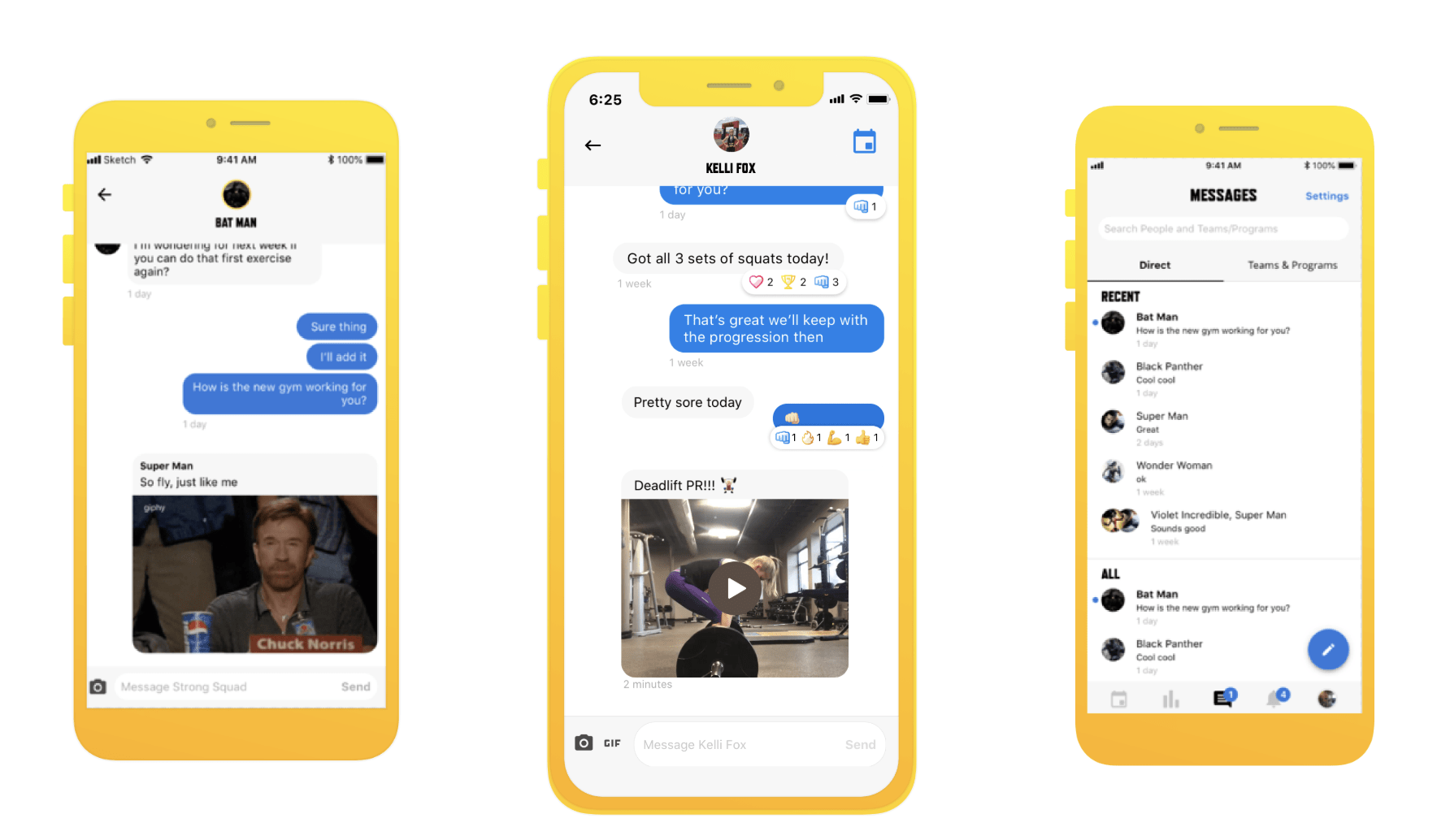The First Female coach
Coach Development | Strength & ConditioningIs being called the first female coach an insult disguised as praise? Or is it spreading awareness that women can achieve anything they want? Are these ‘qualifiers’ helping women in the long run, or does it cause more harm than good?
In this article Nicolai Morris gives insight into what it is like to be a female strength coach in the industry. She sheds light on mistaken identities and provides context about being more inclusive.
Nicolai Morris
Nicolai Morris is a strength and conditioning specialist with High Performance Sport New Zealand, working as the lead S&C practitioner with the Black Sticks Women hockey team and previously with New Zealand Rowing in the elite and U23/Junior pathways.
She is an ASCA Level 2, Pro-Scheme Elite coach, with a Masters in Strength and Conditioning and more than a decade of experience, as well as a background in coaching men’s gymnastics.
// Are ‘Qualifiers’ Helping or Hurting the Industry?
No female strength and conditioning coach wants to be a diversity hire; what we want is to stand on our own merits as a coach.
Not a female coach, but a coach.
If we continue to highlight gender differences, it can give fuel to the idea that we are not equal.
However, without showcasing these women breaking barriers, none may follow. If you can see it, you can be it holds strong in this example.
Women have made huge strides over the years, but there is still work to do. We cannot sit back as victims and accept the world is against us.
We need to be better at recognizing and communicating the advantages female coaches provide to overcome the predominant male perspective.
A case of Mistaken Identity
Every female strength and conditioning coach I have met, has a story of mistaken identity; often more than one.
Most females are mistaken for a fan, a girlfriend or a “more typically female” role such as massage therapist.
Personally, during my strength and conditioning internship within the Australian Football League (AFL) a player asked if I would consider being the dietitian after I finished.
I had worked with this player for five months as a strength and conditioning coach; yet the perception remained that coaching is a man’s role and not a female role.
Sadly, this happens regularly.
I have been told of a situation when a female coach, dressed in full team kit, was asked by fans whether she was a girlfriend of one of the players.
Nearly every female coach I have talked to has a story about another coach disregarding them and introducing themselves to a male assistant or intern with the assumption that the male coach was the lead when in fact she was.
These assumptions or cases of mistaken identity can be a huge challenge to women feeling accepted in an arena dominated by masculinity.
a sense of belonging and self-actualization
According to Maslow’s hierarchy of needs, after physiological and safety the next steps to self-fulfillment are “belonging and love”, “esteem” and “self-actualisation”.
As a female coach, the marginalization of women in sport can challenge the feelings of belonging and love, esteem and self-actualisation.
When attempting to explain the small number of female strength and conditioning coaches within the industry, I often hear it said that women may not want to be strength and conditioning coaches.
Whilst this may be true, if you were looking to join a group that appears to not want you involved in their circle, you might not want to stay.
Instead of accepting there are few women, we should be investigating the barriers and opportunities in place and ways we can increase diversity.
At times it can be a drain never working with another female coach.
No woman, no matter how hard they try, will be “one of the boys” and many will always try to feel accepted into a club that often ostracizes those who are different.
For many years, coaches have been using “the beer test” to assess if they would like to hire someone.
While this is not explicitly male, these comments are laden with bias.
Learned stereotypes and Projection bias
Through many blogs, conferences, and speeches there is a woven thread of male dominated language (he, him, his) embedded to describe coaches. We have been indoctrinated to believe that not only will men make better coaches but are the only coaches.
This is commonly seen through conferences (and more recently webinars) where there are no women represented. It is understood that diversity and inclusion are always critical for talent acquisition, creativity, and performance.
Unconscious bias is an involuntary decision based on learned stereotypes and cultural expectations.
Projection bias is when people (generally in power) assume their own way of thinking and doing is typical or normal, which is amplified by confirmation bias.
These are a subtle but powerful barrier that affect our assumptions, interactions or organizational structure unintentionally promoting men and disadvantaging women.
This is an automatic process triggered by our brains “thin-slicing” and needs to be understood and recognized to encourage real inclusion and diversity. Being a coach, often means the maleness is implicit and unquestioned.
Being male is the default and when a coach is female, it creates a norm violation which is often associated with a powerful negative emotion.
Are we limiting our opportunities?
A recent study by Harvard found women outscored men on 17 out of 19 capabilities differentiating excellent leaders from average or poor ones. However, when it comes to confidence, men excel.
Higher confidence or self-promotion (that can be backed up with performance) can be linked to more career opportunities.
Research found men rated their performance 33% higher than equally performing women.
The researchers explored self-promotion with and without reward (Strategic intervention), privately, and with added ambiguity, in every setting no matter the changes.
The gap was persistent.
Previous studies link this to backlash for women who self-promote “too much”.
This is often highlighted in high school, where fitting in, is essential. Like many strength and conditioning coaches, I was a terrific trainer but a not so talented athlete.
I needed to work my butt off to achieve good results and when I did, I would share my joy with my friends. If this was overheard, it was mocked, and I was told I was arrogant. Trying too hard and caring too much was scorned. Fitting into the pack, and not standing out was important.
There are many ways as female coaches we can help ourselves get ahead and stop sabotaging our careers that the system did not create.
How many strength and conditioning coaches have applied for a role they are not qualified for?
Many of us have also seen a coach hired who did not necessarily tick every box but got hired for the job.
Research has indicated that men apply for roles when they meet 60% of the criteria, whereas women will only apply if they meet 100% of them! Unless women tick every box on a job application (and then some), they will not apply.
Are we depriving ourselves of possible opportunities? Definitely!
Coaching ability is not dictated by gender
Be open to promotion and putting yourself forward for opportunity. We as females need to step up and not wait for others to do it for us.
As a young coach, I was jealous of how close so many male coaches were to each other and how strong their networks were. Instead of waiting for someone to invite me into their network, I went up and talked to them.
I recently created a free monthly forum for female coaches worldwide, to network, upskill and have a sounding board.
Being the first female to occupy a position, takes an extraordinary person to break through the ceiling and weather the challenges that come with it.
Although there have been challenges being female in a male environment, I would not change my experiences. They have given me an opportunity to learn more about myself and my strengths.
They have also made me a better, smarter, more self-aware coach and person.
Having to work harder than those around me to give myself the best opportunities has given me the insight and intelligence to be the best coach I can be.
where do we go from here?
So back to the initial question- is being called the first female helping or hurting us?
After seeing a debate on twitter, I did a very scientific Instagram poll to see what my followers thought.
Overwhelmingly, the reaction was that it is helping, which opposed the twitter debate.
On the one side, it educates and highlights the shortfall in gender equity and shines a light on those breaking the ceiling.
On the other side, others believe it is an insult disguised as praise and can show intentional or unintentional prejudice.
In this present time in sport, I believe it is more important to help those who did not think it was possible as well as to open eyes and opportunities for young women.
I think it is necessary, until there are enough women in sport, and inclusion and diversity are common.
Once that has occurred, we can retire the qualifier of ‘first female’ and just be coaches.
TAKE YOUR TRAINING
TO THE NEXT LEVEL
The TrainHeroic Marketplace
TrainHeroic brings online training and strength programs to life with an unmatched imersive training experience delivered directly to your phone. Browse our Marketplace for thousands of programs or take your training up a notch by joining an online community with fresh programming and coaching by some of the biggest names in the strength game starting at $15 / month.

READY TO TRY TRAINHEROIC?
Our powerful platform connects coaches and athletes from across the world. Whether you are a coach or trainer looking to provide a better experience for your clients, or you’re an athlete looking for expert programming, click below to get started.
Want more training content?
More coaches and athletes than ever are reading the TrainHeroic blog, and it’s our mission to support them with the best training & coaching content. If you found this article useful, please take a moment to share it on social media, engage with the author, and link to this article on your own blog or any forums you post on.
Be Your Best,
TrainHeroic Content Team
HEROIC SOCIAL
HEROIC SOCIAL
TRAINING LAB
Access the latest articles, reviews, and case studies from the top strength and conditioning minds in the TH Training Lab


